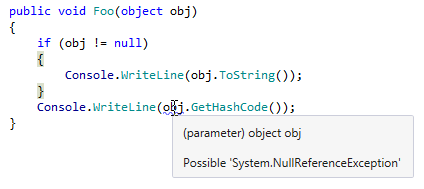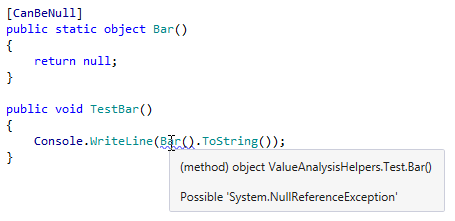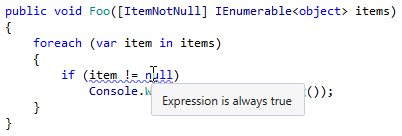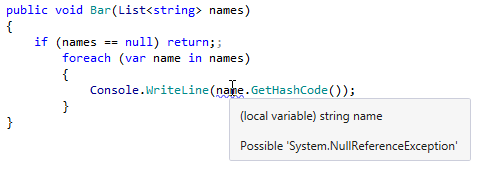Value and nullability analysis
ReSharper performs value analysis to help you find possible 'null' dereferences as well as redundant boolean comparisons and null checks.
Different ways of analyzing nullable values
ReSharper can analyze values in several ways:
By understanding the behavior of language constructs.
In the example below, based on the fact that the parameter
objwas explicitly checked for nullability, ReSharper reasonably supposes that the value ofobjcan be indeed 'null' and displays the corresponding warning:
By relying on code annotation attributes ([CanBeNull], [NotNull], [ItemCanBeNull], [ItemNotNull]) when Nullable reference types are disabled.
In the following example, the method
Baris marked with the[CanBeNull]attribute, Using this information, ReSharper warns you that the return value ofBarcan be null, and calling a method on it could lead to a 'null' dereference:
In C# 8.0 and later, ReSharper can reuse results of the compiler analysis if Nullable reference types are enabled in the project.
Equality comparison analysis
ReSharper helps you analyze the use of the equality operators (== and !=) in the following ways:
It reports equality comparison of floating point numbers.
In addition to compiler warnings of 'Possible unintended reference comparison' (CS0252 and CS0253), it also reports cases when only one of the compared types overrides
Equals().It provides the [CannotApplyEqualityOperator] attribute that helps detect unintended use of the equality operators for types that are designed to be compared using
Equals().
Value and nullability analysis modes
ReSharper can analyze values in different modes:
- Optimistic
By default, value analysis mode is optimistic. In this mode, ReSharper only warns about possible 'null' dereference if the value was explicitly checked for nullability, or if the symbol is marked with the
[CanBeNull]or[ItemCanBeNull]attribute. The optimistic mode is demonstrated in the examples above.- Pessimistic
In this mode, ReSharper warns about possible 'null' dereference in all contexts where the value is not checked for nullability explicitly, unless the symbol is marked with the
[NotNull]or[ItemNotNull]attribute.
To change value analysis mode or disable the analysis, configure the Value analysis mode preference on the page of ReSharper options Alt+R, O.
Nullable reference types
If nullable reference types (NRT) are enabled, ReSharper reuses the results of C# compiler analysis.
NRT improve overall precision of the nullability analysis, but there are cases when NRT contracts can be violated, for example, when values are coming from code without #nullable context. In such cases, you may get false positive warnings for nullability checks (for example, Expression is always 'true' or 'false') . You can choose to ignore nullable API contracts and report a problem only when previous operations with the value in your code guarantee that it can or cannot be null.
You can change this behavior right from the Alt+Enter menu:

... or using the Nullable reference types' warnings mode option on the page of ReSharper options .
When ReSharper ignores nullable API contracts, nullability analysis relies on the program control flow to report redundant null checks. For example:
For more information about NRT and how ReSharper supports them, watch this webinar recording:
Further examples of value analysis
Here are some more examples of ReSharper's value and nullability analysis:
If a nullability check has been already done with a simple LINQ query, ReSharper tells you that a further nullability check is redundant:

The same happens if you mark a collection with the
[ItemNotNull]attribute:
The next example illustrates how value analysis works when the pessimistic mode is enabled. The value of the list was checked for nullability, but not list items. Therefore, ReSharper warns here about possible 'null' dereference.
